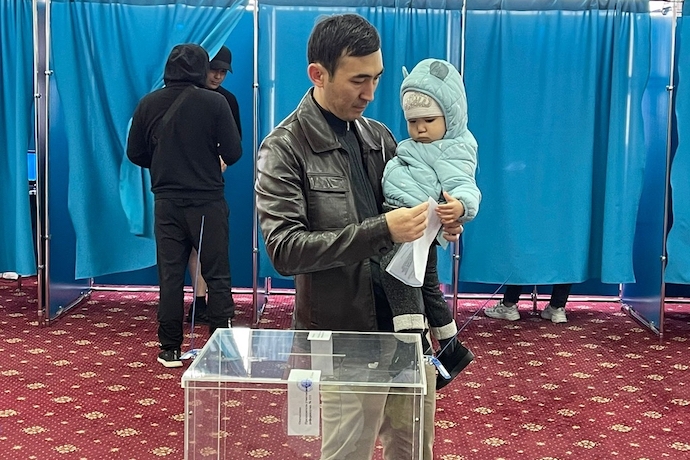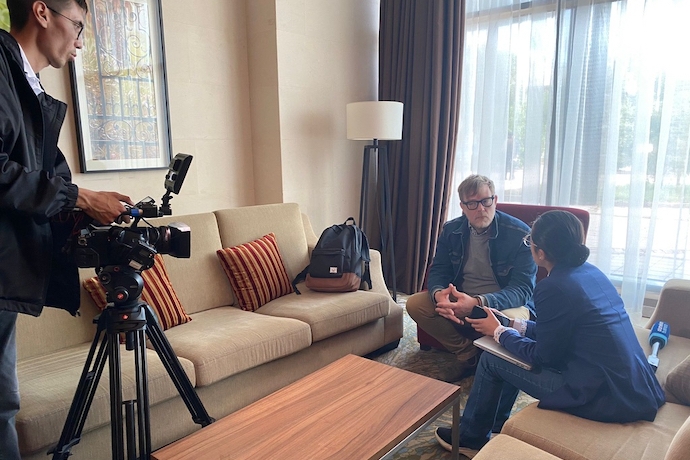The Platform
Latest Articles
by Sohail Mahmood
by Sehr Rushmeen
by Iqra Awan
by Areesha Anwer
by Abdul Mussawer Safi
by Punsara Amarasinghe
by Kanan Heydarov
by Khalid Cherkaoui Semmouni
by Rasel Hossen Shakib
by Gordon Feller
by Sohail Mahmood
by Sehr Rushmeen
by Iqra Awan
by Areesha Anwer
by Abdul Mussawer Safi
by Punsara Amarasinghe
by Kanan Heydarov
by Khalid Cherkaoui Semmouni
by Rasel Hossen Shakib
by Gordon Feller
What Young People Think of the ‘New Kazakhstan’
I’ve been fortunate enough to travel to Kazakhstan twice in the past five years. The first time was in 2018 for a cultural immersion visit, focused on learning about Kazakh traditions and arts. My latest visit coincided with a constitutional referendum on June 5 on whether to adopt several changes to the country’s constitution. Some of the changes included abolishing the death penalty, removing some powers of the president and handing them to the parliament, and not allowing relatives of the incumbent president from holding positions of power.
Out of the dozens of countries I’ve visited over the years, Kazakhstan is one of the more unique. It straddles both China and Russia, but its population looks to the West for everything from social media to pop culture.
This isn’t to suggest that Kazakhstan and its people don’t embrace its past, but its past is increasingly in the rear-view mirror. This is all linked to the referendum.
The government assured me and a group of visiting journalists that the referendum was years in the making, but in truth, it was encouraged by deadly unrest back in January which saw hundreds killed during violent protests.
And while the referendum does enact much-needed reforms by decentralizing power and empowering certain groups in parliament, Joanna Lillis, author of Dark Shadows: Inside the Secret World of Kazakhstan, expressed to Al Jazeera that Kassym-Jomart Tokayev, the country’s president, will still retain key decision-making power. “The president will retain the right to appoint the prime minister, to appoint key ministers in the cabinet, to veto laws and all the other powers that the president has enjoyed for all these years.”

While the referendum doesn’t quite uproot the whole political system or make amends for decades of political atrophy, it does appear to be a welcome development for Kazakhs. The country’s president, Kassym-Jomart Tokayev, has heralded the reforms and the constitutional changes as a ‘New Kazakhstan.’ And indeed, the population overwhelmingly voted for the new changes by 77%, a significant margin for any country where democratic governance is still relatively new, when compared to Western Europe.
I toured polling stations on referendum day, and several Kazakhs I spoke with admitted that they welcomed the referendum in theory, but are taking a ‘wait and see’ approach to whether change truly happens. A young journalist I spoke with was happy that Nursultan Nazarbayev, the previous president since the country’s founding, is gone from office, but admits that she is hesitant to accept that the country can adopt a more Western approach to the world. She was happy nonetheless that Kazakhstan realized that change was necessary.
Another young Kazakh I spoke with explained that while the referendum is a good idea, she has several reservations regarding the vote. “Personally, I think it’s good that they’re putting this referendum, but at the same time, like how the procedure goes that, like, there is not only one question that raised but there is so much stuff there — a lot of changes in 33 articles and around 50 changes. And I don’t really believe that all the people who came to vote actually studied everything there. And I don’t know, how effective is that?”
But when asked about whether politics in Kazakhstan is developing in a positive direction, she explained that change, whether political or social, can’t be sudden. “So, change cannot happen all of a sudden. So, I think that there has to be some time actually spent because it’s been here for generations and decades. I was arguing with my friends several days ago, we should have very fast change. We can’t live like this anymore.”
“But I think it’s impossible to change the country like this. So, [Kassym-Jomart Tokayev] was elected as president two years ago. And there was a pandemic for two years, and then the [Ukraine] war started. And they have been actually dealing a lot with the foreign policy, this kind of quarantine measures. And, yes, I agree that some changes could be faster. But at the same time, I think it’s impossible to have this new Kazakhstan all of a sudden.”

One young Kazakh I spoke with, who had spent time abroad in the United States and Western Europe, explained when asked whether young people are going to stay in Kazakhstan and demand further change or move abroad, she explained: “In my own opinion, if we talk about people in their mid-30s, for example, the generation of my brother, like some of these friends, and my relatives, they just decided to leave the country. And many people work as software engineers because they received an education here and are able to be competitive in Europe, and they just live their life there. But when we talk about my generation, and for example, my group mates and people in their mid-20s, I see a lot of them who really believe that they could be an engine in this new kind of system. And they believe they will be pioneers of this new Kazakhstan, and they could be the foundation of the new changing in journalism or in the IT sphere. Because when going back in 2020, I talked with a lot of young people. And I asked about their plans, because I myself wasn’t sure. Like, what to do. And many people my age, they were saying that, ‘I want to stay here’ and ‘I want to witness like, what’s going to happen with my country.’”
She continued to stress that young people do want to stay and push for change versus ‘throwing in the towel’ and moving abroad, as many Russians have done since its invasion of Ukraine in February. “Like many students and most of the people I talked to, they want to be part of this change. I don’t know what’s going to happen in several years, but if you talk to people in their mid-20s, I think many people want to stay.”
When asked whether Kazakhs are happy, she felt some are, but that inequality in Kazakhstan is a growing problem. “I think there is huge inequality in the country, and almost half of the population live in the villages. The unemployment is rising and therefore I cannot claim that the whole population of Kazakhstan is happy. I cannot claim that everyone is happy with the political regime. I cannot claim that everyone is happy with our salaries. I cannot claim that there are equal opportunities for high school students or for all the kids. I mean, I like the idea that there is a huge expansion in the number of funds and organization from donor countries. And the situation started to change and improve in the areas of health. I think the situation has completely changed and improved but at the same time, I see how rich people get richer, and poor people are just trying to pay their rents.”
But she stressed that despite the growing wealth gap and obvious problems with the current government, Kazakhs are hopeful for the future. “The thing about Kazakhstan, that I mean, what changed in like past several years, it’s probably most people started to have a hope. I don’t know if that’s, I’m not sure if that’s reasonable hope but I can see the trend that people are like, started to believe in something.”
By and large, most of the young Kazakhs I spoke with see that the government has attempted to institute some political reforms and are hopeful for the future, but are still watching the story unfold. The January protests were extremely consequential for the country. Compared to my visit 5 years ago, the current government has acknowledged the previous government of Nursultan Nazarbayev had a corrupting influence and has admitted to his levels of financial and political corruption.
One thing is clear is that while the constitutional referendum was a success and free of corruption, if the government doesn’t carry through with further reforms and the government of Kassym-Jomart Tokayev embraces graft and economic corruption, the people could take to the streets again and demand further structural reforms. The government is on the precipice of gaining the confidence of the public, both young and old, and must follow through to secure a strong belief in the future.
John Lyman is the Editor-in-Chief of International Policy Digest. John completed a Master of Arts in European Studies in 2008 from the University of Amsterdam. John also holds Bachelor degrees in Political Science and Homeland Security from Virginia Commonwealth University.
